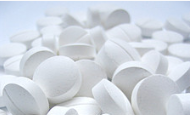worldpharmanewsJanuary 29, 2019
Tag: aspirin , head and neck , anti-inflammatory drugs
Regular use of aspirin or other nonsteroidal anti-inflammatory drugs (NSAIDs) may help some patients with head and neck cancer survive the disease, according to a study led by Professor Jennifer Grandis at the University of California, San Francisco. The study, published today in the Journal of Experimental Medicine, indicates that NSAIDs are effective in patients with mutations in a gene called PIK3CA, and the researchers suggest this is because NSAIDs lower the levels of an inflammatory molecule called prostaglandin E2. The researchers note, however, that they are not yet able to make any specific recommendations about the type, timing, or dosage of NSAIDs such patients should take, and that their results need to be corroborated by a prospective clinical trial.

Head and neck squamous cell carcinoma (HNSCC) accounts for about 4% of all cancers in the US and continues to have high rates of patient mortality. Risk factors for HNSCC include smoking, alcohol use, and human papillomavirus infection, but several studies have shown that regular use of aspirin can reduce the risk of developing the disease. However, whether aspirin or other NSAIDs can promote the survival of patients who have already developed HNSCC is unclear; studies investigating this question have so far produced conflicting results.
One possibility is that NSAIDs are only effective against some types of HNSCC. Around 35% of HNSCC tumors carry mutations that activate the PIK3CA gene, which encodes the catalytic subunit of a key signaling enzyme called PI3Ka. The team of researchers led by Dr. Grandis investigated whether regular NSAID use specifically improved the survival of HNSCC patients with alterations in the PIK3CA gene.
The team, which also included researchers from the University of Pittsburgh School of Medicine and the University of Arizona, analyzed a group of 266 HNSCC patients who had had their tumors surgically removed and, in most cases, were then treated with adjuvant chemotherapy and/or radiotherapy.
Patients without any alterations in their PIK3CA gene were no better off if they also took NSAIDs on a regular basis (defined as taking two or more doses per week for at least six months). By contrast, regular NSAID usage dramatically enhanced the survival of patients whose PIK3CA gene was mutated and/or amplified. Among these patients, NSAIDs increased the overall five-year survival rate from 45% to 78%.
NSAIDs also reduced the growth of tumors in mice injected with cancer cells harboring a mutant PIK3CA gene. By analyzing these mice, Grandis and colleagues found that NSAIDs likely inhibit tumor growth by reducing the production of prostaglandin E2. This proinflammatory molecule has been implicated in a variety of cancers and can be induced by the PI3Ka signaling pathway. NSAIDs may therefore also be effective against a variety of cancers that contain activating mutations in the PIK3CA gene. Indeed, previous studies have shown that regular aspirin usage can aid the survival of colorectal cancer patients carrying mutated PIK3CA.
"The present study is the first to demonstrate that regular NSAID usage confers a significant clinical advantage in patients with PIK3CA-altered HNSCC," Grandis says. "Inconsistencies in the type, timing, and dosages of NSAIDs taken by patients in this study limit our ability to make specific therapeutic recommendations. But the magnitude of the apparent advantage, especially given the marked morbidity and mortality of this disease, warrants further study in a prospective, randomized clinical trial."
Hedberg ML, Peyser ND, Bauman JE, Gooding WE, Li H, Bhola NE, Zhu TR, Zeng Y, Brand TM, Kim MO, Jordan RCK, VandenBerg S, Olivas V, Bivona TG, Chiosea SI, Wang L, Mills GB, Johnson JT, Duvvuri U, Ferris RL, Ha P, Johnson DE, Grandis JR.
Use of nonsteroidal anti-inflammatory drugs predicts improved patient survival for PIK3CA-altered head and neck cancer.
J Exp Med. 2019 Jan 25. pii: jem.20181936. doi: 10.1084/jem.20181936.
Register as Visitor to CPhI China 2019!

-----------------------------------------------------------------------
Editor's Note:
To apply for becoming a contributor of En-CPhI.cn,
welcome to send your CV and sample works to us,
Email: Julia.Zhang@ubmsinoexpo.com.


Contact Us
Tel: (+86) 400 610 1188
WhatsApp/Telegram/Wechat: +86 13621645194
Follow Us:




 Pharma Sources Insight January 2025
Pharma Sources Insight January 2025


